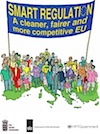Citizens to be at heart of European policy making
“The report, “Smart Regulation: A cleaner, fairer and more competitive EU†addresses this and shows how smart EU regulation — that improves consultation with “end-usersâ€, such as businesses and consumers, throughout the legislative process — will support growth and recovery in the current economic climate, maximise the European Union’s social and environmental benefits, while reducing burdens and costs.”
Note the use of the term “end-user“:
“We use the term ‘end-user’ to capture everyone who is affected by regulation – both those who incur costs as a result of compliance and those who receive its benefits. In many cases, these groups can often be the same. People who ‘use’ regulation should be able to understand why it is needed, what its benefits are and that the costs it may impose are necessary and proportionate.
We believe that making end-users central to the policy-making process – by being aware of their needs, seeking their views, using these views and demonstrating the value of their contributions – is the best way to achieve this aim. End-users are best placed to provide relevant, up-to-date information, which can improve the quality of the evidence on which decisions are based.”
The Commission, state the authors, should reinforce and apply user-centric approaches when developing new legislation. This will help ensure that the legislation is well targeted and effective and increase the likelihood of compliance.
USER-CENTRIC APPROACH TO IDENTIFYING REGULATORY BURDENS
There are many examples across the EU where Member States and the Commission can draw inspiration on how to seek views and communicate with end-users:
Kafka (Belgium) – Belgium’s Kafka initiative introduced an online contact point, www.kafka.be where citizens can submit comments on existing regulations and make proposals for their improvement and simplification. The proposals received on the website have formed the basis of a reform programme – the Kafka Plan – for the entire Federal Government. Over 200 specific simplification projects have been implemented under the plan, ranging from the abolition of paper accounts to the improvement of home-working regulations.
Burden Hunters Project (Denmark) – The Burden Hunter project applies user-centric innovation techniques to allow users themselves to identify the red tape that causes them most irritation. Civil servants have conducted visits to businesses to see first- hand the regulatory challenges they face. The user-centric approach allows businesses themselves to set the agenda for regulatory action and help develop solutions to cut administrative burdens. Work is ongoing to deliver results on a range of problems within nine areas perceived as particularly irritating, including government inflexibility, lack of mutual obligation and complexity. The Burden Hunter project has led to identifying a number of new initiatives to cut red tape.
Simplifying Together (France) – France has developed a framework that focuses on ‘life-events’ in order to better understand the burdens faced by businesses. These include key points in the life of a business, such as starting up, moving premises or hiring an employee. Using this framework, and through a broad process of consultation with the users of regulation, they have developed a programme to reduce the number of processes, the cost and the time to navigate these events.
– Read press release
– Download executive summary
– Download report




